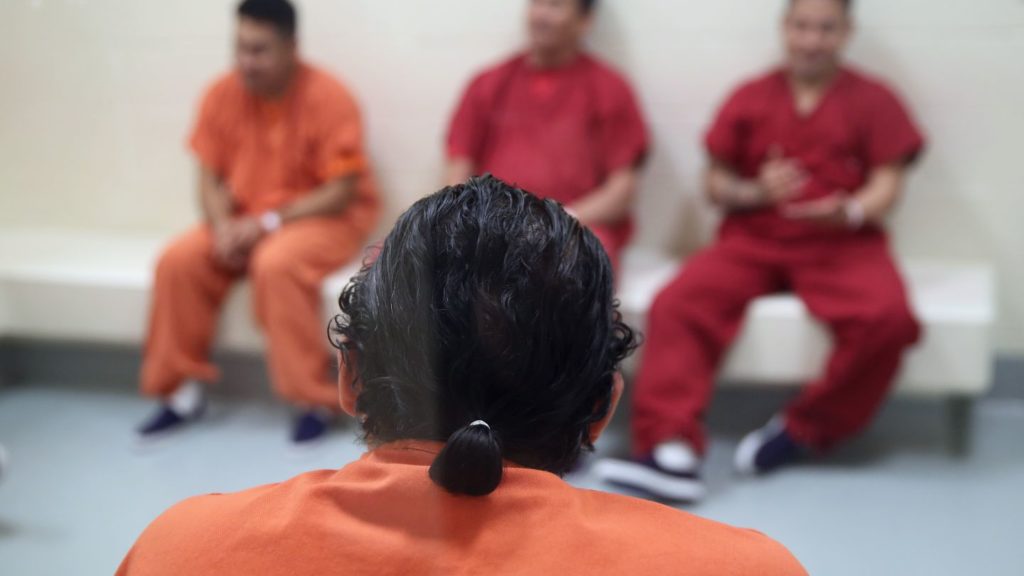Private Prisons’ New Plan to Cover Losses Involves More Immigrants in Detention Centers
ANGLO AMERICA, 7 Nov 2016
Casey Tolan | Fusion – TRANSCEND Media Service
4 Nov 2016 – Federal immigration authorities expect to hold record numbers of detainees over the next year, and that’s music to the ears of private prison executives.
Executives from the two biggest private prison companies in the country told investors Thursday [3 Nov] morning that they saw a major growth opportunity in detaining those immigrants—even as other private prisons are closing. The GEO Group and CoreCivic (previously known as Corrections Corporation of America) both reported higher-than-expected profits due to Immigration and Customs Enforcement detaining more people in the last three months.
ICE currently holds just over 40,000 immigrant detainees, more than any time in the agency’s history, the Wall Street Journal reported recently. By June 2017, that number is expected to balloon to 47,000 people. The surge in immigrants comes as Central American refugees and Haitians are fleeing violence and economic devastation.
The way private prisons are taking advantage of this is best illustrated by the Cibola County Correctional Center in New Mexico. In 22 years of operation, the privately run prison saw a string of inmate deaths, had one of the worst ratings of any federal private prison, and at some times didn’t have a single doctor on site. The Department of Justice announced in August that they were ending the contract for Cibola effective October 30, making it the first federal facility to close as part of a larger effort to phase out private prisons.
Last week, however, the company operating the prison, CoreCivic, signed a contract with ICE to reopen the Cibola facility as an immigrant detention center, housing up to 1,116 detainees for the next five years. The last federal prisoners were moved out last week, and immigrant detainees are expected to start moving in at any time. (Ironically, the detention center opened as an ICE task force studied whether the agency should get rid of its private prisons altogether.)
The same story could play out again over the next year as ICE searches for detention center beds to hold its surging population of detainees, prison executives said.
“I think the private sector is the only logical solution” for ICE to quickly house immigrant detainees, George Zoley, the CEO of the GEO Group, said on a conference call. He said the company was in discussions with ICE about opening new detention centers, and had empty prisons with a total of more than 3,000 beds that could be brought online on short notice.
Instead of signing new private prison contracts, ICE could release detainees on bail or community supervision—especially asylum-seekers fleeing violence or immigrants without serious crime convictions. That would reduce their detention population by thousands (and save taxpayers big money).
“This is a crisis of the agency’s own making,” said Carl Takei, a lawyer with the ACLU who studies the private prison industry. “Right now, ICE is just out of control.”
In a statement received after publication, ICE didn’t directly address whether they were negotiating contracts for new private detention facilities. “ICE remains committed to providing a safe and humane environment for all those in its custody,” spokesperson Jennifer Elzea said. “ICE’s civil detention system reduces transfers, maximizes access to counsel and visitation, promotes recreation, improves conditions of confinement and ensures quality medical, mental health and dental care.”
In addition to immigrant detention, GEO and CoreCivic emphasized efforts to move beyond just housing prisoners. They both are focusing on new contracts for halfway houses and electronic monitoring of released prisoners.
GEO is also expanding abroad, building a private prison near Melbourne, Australia, that Zoley said would have “the most comprehensive inmate rehabilitation program in the world,” as well as pursuing several other contracts in the country.
The presidential election next week could have a huge impact on the private prison industry: Trump has praised private prisons while Hillary Clinton has said she wants to close all private prisons. But the executives didn’t mention the candidates, and tried to play down worries over their companies’ precipitous drop in stock price earlier this year.
“There has been an overreaction in the market to the long-term viability of our business,” CoreCivic CEO Damon Hininger said.
______________________________________
Updated 11/4/16 with statement from ICE.
Casey Tolan is a National News Reporter for Fusion based in New York City.
DISCLAIMER: The statements, views and opinions expressed in pieces republished here are solely those of the authors and do not necessarily represent those of TMS. In accordance with title 17 U.S.C. section 107, this material is distributed without profit to those who have expressed a prior interest in receiving the included information for research and educational purposes. TMS has no affiliation whatsoever with the originator of this article nor is TMS endorsed or sponsored by the originator. “GO TO ORIGINAL” links are provided as a convenience to our readers and allow for verification of authenticity. However, as originating pages are often updated by their originating host sites, the versions posted may not match the versions our readers view when clicking the “GO TO ORIGINAL” links. This site contains copyrighted material the use of which has not always been specifically authorized by the copyright owner. We are making such material available in our efforts to advance understanding of environmental, political, human rights, economic, democracy, scientific, and social justice issues, etc. We believe this constitutes a ‘fair use’ of any such copyrighted material as provided for in section 107 of the US Copyright Law. In accordance with Title 17 U.S.C. Section 107, the material on this site is distributed without profit to those who have expressed a prior interest in receiving the included information for research and educational purposes. For more information go to: http://www.law.cornell.edu/uscode/17/107.shtml. If you wish to use copyrighted material from this site for purposes of your own that go beyond ‘fair use’, you must obtain permission from the copyright owner.

